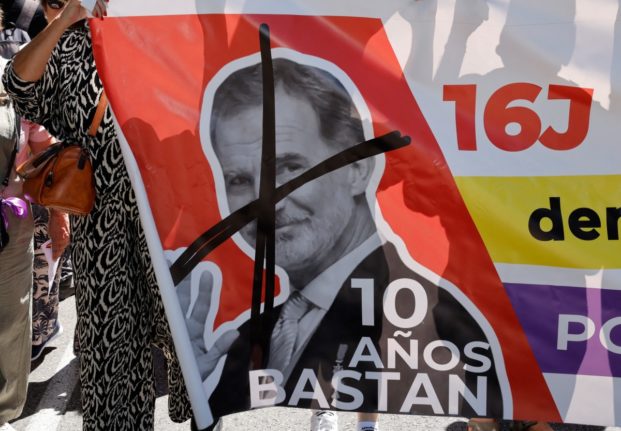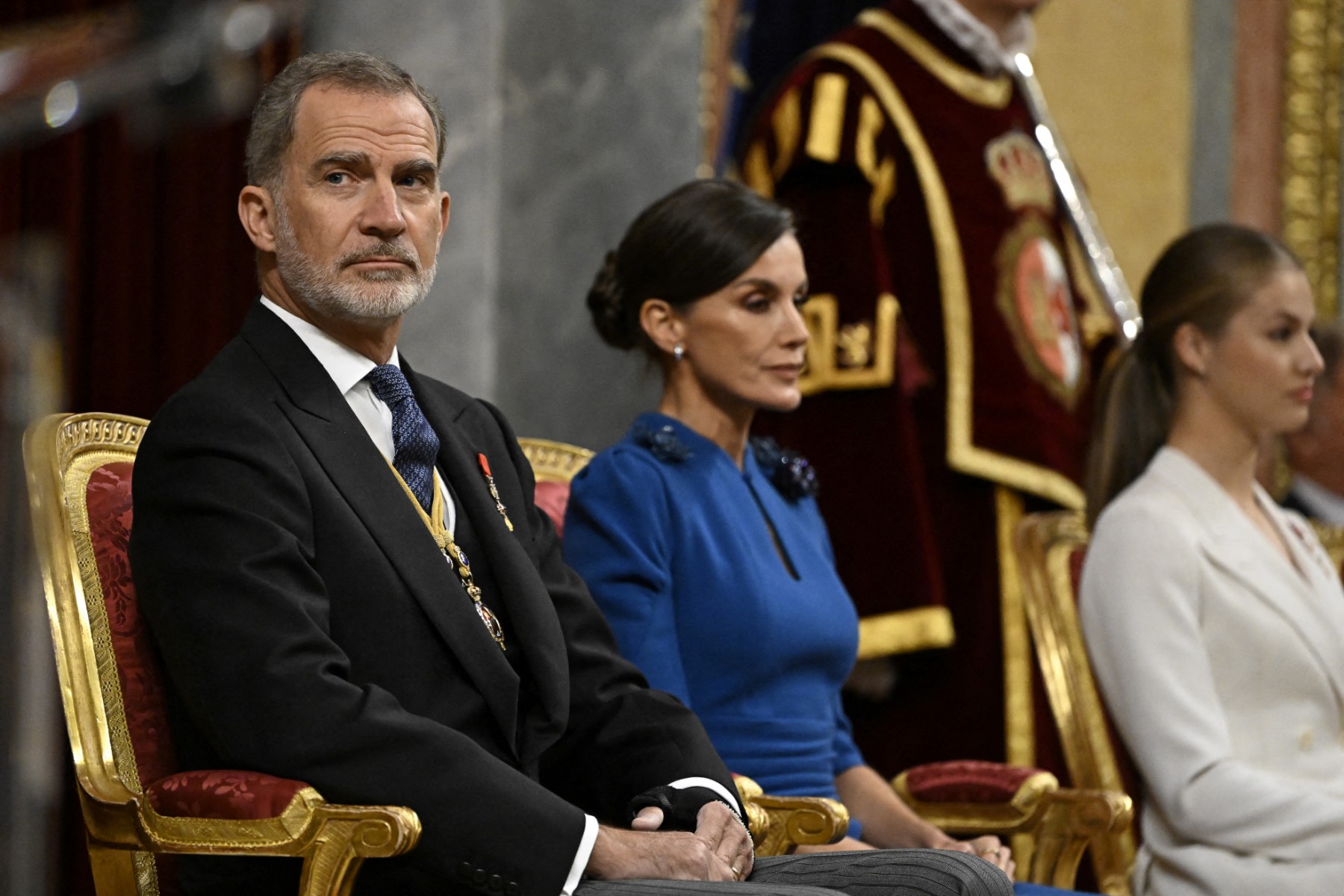Spanish Prime Minister Pedro Sánchez’s Socialist party (PSOE) suffered heavy losses across the country at both regional and municipal levels on Sunday May 28th, with right-wing rivals Partido Popular (PP) making huge gains, taking symbolic provincial capitals and seemingly setting itself up for government.
READ ALSO: Five key takeaways from Spain’s regional and local elections
After dealing with the Covid-19 pandemic and cost of living crisis, Sánchez’s PSOE-led coalition government fell victim not only to voter fatigue but the birth of “a new political cycle”, according to PP leader Alberto Núñez Feijóo.
Spanish pollsters have long predicted that PP would win the next general election and that Feijóo would be the next Prime Minister of Spain. The crushing defeat PP inflicted on Sánchez’s PSOE at the weekend seemed to confirm this political direction of travel.
But then, on the morning of Monday 29th May, in the aftermath of the elections, Sánchez shocked the country and called a snap general election for July 23rd. Though some PSOE supporters have described this as brave, many view it as not wanting to delay the inevitable.
Indeed it seems very likely now, all things considered, that Feijóo will be Spain’s Prime Minister by the end of the summer. Generally considered to be a moderate, middle-of-the-road politician, Feijóo’s long career has earned him a reputation as a centre-right technocrat who balances the books and plays it safe.
This was particularly true when he took over PP amid scandal and infighting, but if you dig a little deeper, Feijóo, like anyone, has his quirks and weaknesses.
He can be gaffe-prone, a little wooden, and perhaps the only PP leader in the history of the party who openly admits to voting for PSOE in the past. And then, of course, there’s that awkward photo of him relaxing on a yacht with a well-known drug trafficker that is sure to show up again on the campaign trail this summer.
But who is Alberto Núñez Feijóo?
What’s his background, what are his politics, and what sort of Prime Minister can Spain expect him to be if PP wins in July?
Background
Alberto Núñez Feijóo was born in September 1961 in Los Peares, a small town in Ourense province in the north-western region of Galicia. He was partly educated in a private Maristas school.
He studied Law at the University of Santiago de Compostela and joined the Xunta de Galicia as a civil servant in 1985. He made the switch to politics, and in July of 1991 was appointed to Galicia’s Ministry of Agriculture, Livestock and Forestry.
Between 1992 and 1996 Feijóo was vice president and then general secretary of the Galician Health Service, and in 1996 left his native Galicia and moved to Madrid to be Secretary General of Health Care in Spain’s Ministry of Health, and later served as president of Insalud, the former national health service in Spain.
Between 2000 and 2003 he was President of Correos, Spain’s postal service, and by virtue of these institutional roles, Feijóo developed a reputation as a sensible, fiscally conservative technocrat whose first priority was the balance of the books.
La Xunta
In 2003 he returned to Galicia to join the regional government and was appointed Minister of Territorial Policy, Public Works and Housing, and a year later was appointed first vice-president.
After a few years in the regional government, and some significant internal party manoeuvring, Feijóo established himself as the successor to his political mentor and ‘godfather’ José Manuel Romay Beccaría, according to there Galician press, and became leader of Galician Partido Popular.
Then a period of political success followed – one PP will be hoping he can replicate at the national level.
In 2009 Feijóo ran for the presidency of the Galician regional government, and PP won an absolute majority after four years out of government.
Feijóo officially became Galician President on April 16th, 2009, and increased his hold on the region in the subsequent three elections: with 41-seat majorities in 2012 and 2016, and 42 in 2020.
A record of four consecutive absolute majorities is something very rare in the Spanish political system, at any level, and Feijóo’s time running Galicia is also notable for the fact that Vox did not gain a single representative during his leadership.
READ ALSO: Spanish right surges in local polls, dealing blow to Sánchez
It remains unclear if this will be viewed as a positive or negative heading into the general election. Perhaps it is evidence of Feijóo’s moderate approach successfully sidelining extremists, or perhaps it emphasises his inexperience when dealing with them.
Firmly established as a PP ‘baron’ and respected voice on the national stage, Feijóo watched from Galicia as the national party began to implode in late-2021, led by the erratic and confrontational former leader Pablo Casado, whose leadership was unravelling amid a bitter internal rivalry with Madrid President Isabel Díaz Ayuso and difficulties pandering to far-right Vox, who were beginning to outflank PP on certain issues.
When the inevitable fallout happened, Feijóo stepped in and announced his candidacy. After the turmoil of recent months, a well-established, well-respected ‘safe pair of hands’ was exactly what the party wanted.
In April 2022, Feijóo was elected PP President in Seville with 98.35 percent of the vote.

Politics and ideology
Feijóo’s career has earned him a reputation as a steady, moderate politician who knows how to win. He is not perceived as an overly ideological or emotional man, but rather more of an administrator with experience of running large institutions.
He certainly tries to project this image himself, claiming that “being left-wing or right-wing seems absolutely old to me,” and even admitting that he voted for PSOE in 1982 and 1986.
Almost Feijóo’s entire time as PP leader has been appealing to the political ground, both by trying to keep Vox at arm’s length and attacking the far-left and separatist forces supporting the Sánchez government.
Feijóo is, he’d like us to believe, a competent centrist. But that’s not to say that his Galician government wasn’t without its critics, or was totally devoid of an ideological bent. In fact, his perceived commitment to economic neoliberal orthodoxy, particularly harsh cuts to public spending in order to reduce deficits, received criticism throughout his time in the Xunta and certainly places him more rightward on economics.
According to Publico, during his term, 1 in 10 public schools were closed in Galicia, more than 140 across the region, and he cut the region’s education budget by over €100 million.
He also faced opposition in the Xunta for his pro-privatisation positions on other public services, notably the health service.
On the campaign
Moderate, fiscally conservative and measured. These are the sorts of terms usually used to describe Feijóo, whether as compliments or insults. And the recent regional results certainly seem to suggest that Spaniards may be ready for a period of relative calm and stability, compared to the volatility of recent years.
But whether or not simply being a boring alternative to chaos (in this regard, he is in the mould of the Labour Party’s Keir Starmer in the UK) is enough to campaign on, remains to be seen.
One thing nobody would accuse Feijóo of is charisma. Despite his tendency to do catalogue-like photoshoots, he is not a natural performer, and often when going toe to toe with the slicker Sánchez in Congress he has appeared awkward and heavy-footed.
The Galician is also quite prone to gaffes. Not only was he unaware that cows were female despite running the region’s Agricultural Ministry for years, and asked a farmer why they all had female names, but he also claimed publicly that George Orwell wrote 1984 in 1984, not 1949, as everyone else had thought.
Following the recent elections, however, Feijóo and PP clearly have a big head start on Sánchez and PSOE.
This is helped by the implosion of Ciudadanos, whose voters naturally move rightwards to PP, and the internal power struggles in the parties to the left of PSOE. It is very likely the Galician will be the next Prime Minister.
But campaigns do matter, and up against Sánchez’s polished ‘el guapo‘ brand, however damaged, it remains to be seen how Feijóo’s occasionally awkward demeanour will hold up under the scrutiny of a national election campaign. Sánchez’s decision to bring the election forward, despite poor results for his party, does indicate that PSOE is making this a now or never, the ‘gloves are off’ election.
How he balances attacking Sánchez’s reliance on extremists while likely himself relying on Vox will be particularly interesting, and a likely PSOE attack line.
And Feijóo does feel like a man prone to make a mistake. Weeks out from a polling day, big blunders can take on a much greater significance.
That, and the infamous photo of him on a yacht with convicted drug trafficker Marcial Dorado will surely make several appearances during the campaign. Maybe he isn’t so boring after all.




 Please whitelist us to continue reading.
Please whitelist us to continue reading.
But how do we pronounce his name? Fey O-o?